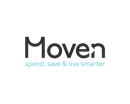With its tagline of “Spend, save and live smarter,” Moven is a revolutionary mobile banking app that not only serves as a no-fee debit card but also serves as a virtual financial advisor, helping customers know where their money is going with real-time feedback on every spending decision.
A free download for iOS devices and on Android, its app is also available on smartwatches with Apple Watch, the Android Moto360 and Samsung Gear. Its financial partners include MasterCard in the US, TD Bank in Canada and Westpac in New Zealand.
Moven COO Ramy Serageldin elaborates on the opportunity for banks to create a more personalized and meaningful relationship with customers in a chat with Interbrand senior director of strategyMeghann Fraser.
They are both speaking on a fintech panel today in New York: “Too Big to Evolve? How customer-centric innovation will change financial services,” an event co-hosted by Ready Set Rocket, Interbrand and Baruch College’s Zicklin School of Business. Below, they discuss how financial services brands and startups can work together to help consumers manage their personal finances.
Meghann Fraser: With “buy” buttons coming to Facebook, Google and beyond, mobile commerce is about to get ubiquitous. What does that mean for the role of a brand?
Ramy Serageldin: With more and more commerce moving to online and mobile, people are looking for two things: convenience and trust. The one-click “buy” buttons solve the convenience problem– sometimes too convenient for impulsive shoppers. The brand will become more important as a trust factor. With the recent breaches at merchants and even the IRS, customers are becoming increasingly aware of the risk of giving their payment information to a merchant, whereas a trusted brand managing the payment at the point of checkout can alleviate those concerns.
Fraser: UBS is publicly acknowledging that banks need fintech help with its future of finance challenge. What kind of insights can bigger financial brands learn from startups in this space?
Serageldin: In short – a lot! The biggest thing banks need help with is how to execute on innovation. Banks are typically not organized to do so because of archaic processes, rigid budgeting cycles, risk aversion and legacy systems. Startups benefit from not having this baggage of complexity. Equally important, all successful startups have their customers’ best interests in mind. Ultimately, most banking products are commodities and you need to build experiences around those products that fit the customers’ needs (and not the other way around).
Many innovative banks are looking to take advantage of the fact that startups can execute more quickly on ideas by partnering with them. It’s a powerful combination of the startup’s innovative thinking, customer focused experience and technology, combined with the bank’s brand, scale and market knowledge. We’ve been fortunate at Moven to have already signed a couple of bank partnerships (with TD Bank and Westpac) and we’re working on more.
Fraser: How can companies better align their brand promise with customer experience, given that so many (according to Forrester) are failing on that front?
Serageldin: Customer expectations have changed. For example, today there is an app for everything – walking your dog, dating, finding cheap gas or a taxi. Those apps provide a unique and engaging experience. However, when customers look at the banking industry, they are not seeing the same advancements. They are seeing the same cookie-cutter experience that emphasizes the bank’s needs first vs. the customer’s. So the brand promise needs to be reflected in the experience – which for the majority of customers means the digital experience. Banks should be asking themselves, are the tools, products and services I’m delivering to my customer going to help them solve a need? Is is easy and intuitive to use?
Fraser: How are smart wearables such as Apple Watch changing retail banking and customer behavior?
Serageldin: The form factor requires a different approach to communicating with a customer. Just as trying to shrink down an online banking experience to fit onto a mobile screen didn’t work, trying to shrink a mobile experience onto a wearable won’t work either. It is still early to see how smart wearables are going to change banking and customer behavior in the long-run.
What we do know is that it is forcing banks (and all app companies, really) to become really good at providing contextual, interactive, real-time communications to their customers. These “glance able interactions,” as they are being called, will supplant app interactions over time. Customers will make the decision to engage deeper (typically by opening the app), or not because they feel it isn’t worth it. We will see more of the interactions moving to the wearable – bite size, one-click actions.
Customer expectations will also increase to expect to see the information they need when they need it. At Moven we feel there is a lot of promise in this space. We’re working on an Impulse Savings feature, where we’ll send the customer a notification to their watch (and phone) when, based on our analytics, there is a good opportunity for them to save. The customer simply selects from the suggested savings amounts and we’ll take care of the transfer on the back end without them ever going into the app.
Fraser: Customers need to become more engaged with their finances as mobile banking becomes the norm — how do you maintain a human touch in the process?
Serageldin: Our philosophy is that the human interactions should be limited and for positive, engagement building purposes. If you’re interacting with a human for a support need, then we have failed. It is important to make sure the basics are covered – easy to use, self-service tools for most everything you can. The key is to create engaging customer-centric experiences to help solve real problems (managing a budget, buying a home, saving for retirement, understanding debt). Then for those customers that value a human interaction, it is important that it is a consistent customer experience with the digital one.




